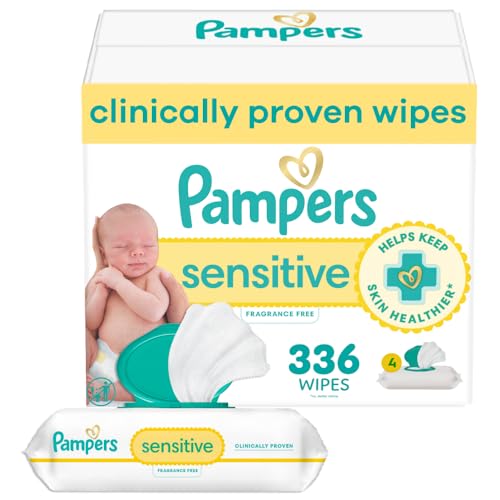In the world of newborns, the frequency of poop can be as unpredictable as a summer storm. But how many times should our little ones really be going in a day?
Understanding these tiny but essential details can shed light on our baby's health and well-being. Let's explore the intricacies of newborn poop and discover the valuable insights it can offer us as caregivers.
Key Takeaways
- Newborns typically pass stool multiple times a day, up to 6 or more in the first six weeks.
- Breastfed babies have more frequent bowel movements than formula-fed babies.
- Changes in poop consistency over time are normal, but abnormalities like blood or constipation require attention.
- Monitoring poop frequency and seeking medical advice for concerns are crucial for newborn digestive health.

Diaper Genie Classic Diaper Pail Gift Set | Push-N-Lock Odor Control | Includes Starter Refill and Jumbo+ Refill | Holds up to 1,245 Newborn Diapers | Baby Registry Must-Have
ULTIMATE ODOR CONTROL – The Diaper Genie pail works with diaper genie refill bags made from a continuous…
As an affiliate, we earn on qualifying purchases.
As an affiliate, we earn on qualifying purchases.
Normal Bowel Movement Frequency for Newborns
Newborns typically pass stool multiple times a day, with breastfed babies generally experiencing more frequent bowel movements than formula-fed infants. It's common for a newborn to have up to 6 or more bowel movements daily in the first six weeks, especially after each feeding session.
Formula-fed babies, on the other hand, usually have 1-4 bowel movements per day, often with larger stools compared to breastfed infants. While some newborns may have fewer bowel movements, ranging from once a day to once a week, this can still be considered important as long as the baby is gaining weight.
Monitoring the frequency of your newborn's bowel movements is essential. Any concerns about irregular patterns should be promptly discussed with a healthcare provider. Remember, every baby is unique, and what's most important is that your little one is healthy and thriving. Trust your instincts and seek guidance when needed to ensure your baby's well-being.

Pampers Baby Wipes, Sensitive, Water Based Wipe, Clinically Proven, Hypoallergenic, and Unscented for Babies, 336 Wipes Total (4 Flip-Top Packs)
336 Wipes in 4 Packs of Pampers Sensitive Baby Wipes, Water Based, Hypoallergenic and Unscented
As an affiliate, we earn on qualifying purchases.
As an affiliate, we earn on qualifying purchases.
Breastfed Newborn Poop Frequency
When breastfeeding, it's common for babies to pass stool frequently, with some newborns having multiple bowel movements each day. Breastfed newborns may poop after each nursing session, resulting in up to six or more poops daily in the first six weeks. The frequency of breastfed newborn poop can vary from multiple times a day to once a week. Breastfed babies tend to have more frequent bowel movements compared to formula-fed babies. Breastfeeding stimulates the baby's digestive system, leading to more frequent pooping.
It is important to understand that breastfed newborns have unique poop frequency patterns that reflect their health and nutrition. As caregivers, monitoring these bowel movements is vital for ensuring your baby is receiving adequate nourishment and maintaining good health. Remember, each baby is different, so variations in poop frequency among breastfed newborns are normal. Trust your instincts and consult with a healthcare provider if you have concerns about your baby's poop frequency.

Lily Miles Baby Diaper Caddy Organizer – Large Tote Bag for Newborn essentials Boy or Girl – Baby Shower Basket – Nursery Must Haves – Registry Favorites – Newborn Caddie Car Organizer
Water-Resistant, Easy-Clean Fabric – Made with premium water-resistant materials that wipe clean in seconds. Perfect for busy parents…
As an affiliate, we earn on qualifying purchases.
As an affiliate, we earn on qualifying purchases.
Formula-Fed Newborn Poop Frequency
Shifting to formula feeding, newborns typically exhibit a poop frequency of 1-4 bowel movements per day. While the frequency of poop in formula-fed infants can vary from baby to baby, it's common for them to have fewer but larger stools compared to breastfed babies. Understanding the typical poop schedule for formula-fed newborns is essential in monitoring their digestive health. It's vital to keep in mind that formula-fed babies may poop less frequently than breastfed babies, and this variance is generally normal.
Keeping an eye on the consistency and frequency of your formula-fed newborn's poop is essential for evaluating their digestive well-being. Changes in stool consistency or a significant decrease in the frequency of poop could indicate an issue that needs attention. By staying attuned to your baby's bowel movements, you can make sure they're on track for healthy digestion. Remember, every baby is unique, so what's normal for one may differ for another.

Frida Baby Mobile Medicine Cabinet Travel Kit, Set Baby Essentials Gift Set Includes NoseFrida Snotsucker, Rectal Thermometer, MediFrida Medicine Dispenser with Portable Carrying Case
ALL-IN-ONE BABY HEALTHCARE ESSENTIALS ON THE GO: The Frida Baby Mobile Medicine Cabinet features a portable travel case…
As an affiliate, we earn on qualifying purchases.
As an affiliate, we earn on qualifying purchases.
Changes in Baby Poop Over Time

As babies grow, their poop undergoes natural changes in consistency and frequency, reflecting the continuous development of their digestive system. Here are some key points to help you understand the changes in your baby's bowel movements over time:
- Meconium: Newborns typically pass meconium in the first few days after birth, which is a dark, sticky, tar-like substance. This will evolve to softer and more liquid stools as the baby starts feeding.
- Frequency: Initially, newborns may have several bowel movements a day. However, the frequency usually decreases after the first six weeks as their intestines mature. It's normal for babies to poop less often, sometimes even 1-2 times a week, as long as they're gaining weight and are healthy.
- Changes with Solid Foods: Introducing solid foods can lead to changes in stool consistency and odor as the baby grows. These changes are expected as part of the digestive system's development.
- Warning Signs: While changes in poop consistency are normal, diarrhea, constipation, or blood in the stool should be addressed promptly to safeguard your baby's health and well-being.
When to Seek Medical Advice
If your newborn shows signs of abnormal stool patterns or constipation, it's important to promptly seek medical advice to guarantee their health and well-being. Any concerns about your newborn's poop frequency or consistency shouldn't be ignored. Remember, if your newborn hasn't pooped in 4 days or if you notice blood in their stool, immediate medical attention is critical to rule out serious issues.
Signs of dehydration or symptoms of constipation also warrant contacting a healthcare provider promptly. Trust your parental instincts – if something feels off, it's always better to seek professional advice.
Discussing any worries about your newborn's poop with a pediatrician can provide reassurance and make sure that any potential problems are addressed early on. Your healthcare provider is there to support you and your baby's health, so don't hesitate to reach out whenever you have concerns.
Frequently Asked Questions
How Many Poop per Day Is Normal for Newborn?
We comprehend the concern about newborn poop frequency. It's normal for babies to poop multiple times a day, especially if breastfed. However, each baby is unique; consulting a pediatrician for any worries about poop patterns is essential.
How Often Should a Newborn Poop Chart?
Understanding the anxiety that can come with keeping track of newborn poops. It's comforting to know that breastfed babies might go up to 6 times daily, while formula-fed ones may poop 1-4 times. Changes are normal as they grow.
How Many Times a Day Should a Newborn Poop on Formula?
I comprehend your concern about your formula-fed newborn's poop frequency. It typically ranges from 1-4 times a day. Every baby is unique, so variations are normal. Keep an eye on consistency too. If worried, consult your pediatrician for peace of mind.
How Do I Know if My Newborn Is Pooping Too Much?
If your newborn is pooping excessively, it might signal a concern. Keep an eye on the frequency and consistency. Any drastic changes warrant a chat with your pediatrician. We're here to support you.
Conclusion
Monitoring your newborn's poop frequency and consistency is important for their overall health.
While there's no set number of times a baby should poop in a day, it's important to stay informed and seek medical advice if there are any concerns.
By staying vigilant and communicating with your pediatrician, you can guarantee that your baby's digestive system is functioning properly and address any potential issues early on.
Your baby's well-being is worth the extra attention and care.









